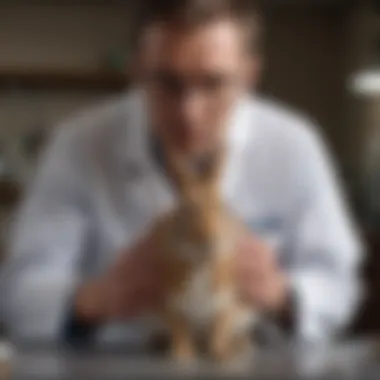Essential Vaccinations and Health Care for Rabbits


Intro
Rabbits are popular pets, admired for their gentle nature and unique personalities. However, they require dedicated care to stay healthy and happy. One fundamental aspect of this care involves understanding the essential vaccinations and health care practices necessary for rabbits. This guide explores vital preventive measures, shedding light on vaccination schedules, common diseases, and maintenance of health. It aims to empower rabbit owners with the knowledge needed to provide the best environment and health care for their pets.
Care Tips
Providing proper care is essential for the overall well-being of rabbits. Here are several critical areas that need attention:
Daily Care Routines
Daily routines for rabbit care involve feeding, exercising, and social interaction. Regular feeding times help create structure in your rabbit's day. Exercise is crucial, as it keeps them active and prevents obesity. Spending time engaging with your rabbit enriches their life and strengthens the bond between owner and pet.
Cage Setup and Maintenance
A well-structured cage provides a safe environment for rabbits. The cage size should be spacious enough to allow movement. It is essential to include areas for resting, eating, and playing. Regular cage cleaning is vital to prevent odor and disease. A clean, well-maintained habitat contributes to a rabbit's happiness and health.
Hygiene and Cleaning Practices
Maintaining hygiene is essential. Daily spot cleaning to remove waste and uneaten food is necessary. Deep cleaning should be done at least once a week. Use rabbit-safe cleaning products that do not harm them. This practice helps reduce risks of infections or parasites.
Seasonal Care Adjustments
Seasonal changes affect rabbit care routines. In colder months, ensure the cage is insulated and free from drafts. During warmer months, provide shade and plenty of water to avoid overheating. Each season brings unique challenges where adjustments may be required.
Wellness and Health
Regular health assessments play a significant role in maintaining rabbit health. Here’s what to consider:
Routine Health Checkups
Routine checkups with a veterinarian who specializes in rabbits are crucial. This allows for early detection of potential issues. Typically, a vet visit once a year is recommended for healthy rabbits.
Identifying Symptoms of Illness
Rabbit owners should be observant of their pet's behavior. Signs of illness might include changes in appetite, lethargy, or abnormal droppings. Noticing these signs early can be key to ensuring your rabbit receives timely medical attention.
Preventative Care and Vaccinations
Preventative care is paramount for rabbit health. Vaccinations against diseases such as Myxomatosis and Rabbit Viral Hemorrhagic Disease are highly recommended. A veterinarian will provide a vaccination schedule tailored to your rabbit's specific needs.
Mental and Emotional Well-being
Mental stimulation is as important as physical health. Providing various activities and social interactions helps prevent boredom and anxiety. Consider incorporating toys and social time into your rabbit's daily routine.
Epilogue
Taking care of a rabbit goes beyond basic feeding and shelter. Understanding the importance of vaccinations and routine health care is essential for providing a safe and healthy environment. By following these guidelines, rabbit owners can help ensure a long, vibrant life for their pets.
Foreword to Rabbit Care
Caring for rabbits extends beyond mere feeding or providing shelter. Rabbits require a unique set of considerations that combine both physical and emotional well-being. Understanding the core aspects of rabbit care is essential for any owner who wants to ensure the health, happiness, and longevity of their pet.
Among the most crucial elements of rabbit care is the maintenance of a proper diet. Rabbits thrive on a balanced intake of hay, fresh vegetables, and commercially prepared pellets. Just as important is the provision of clean water. Regular access is vital to their overall health. Moreover, understanding the dietary needs helps prevent potential health issues, such as gastrointestinal stasis, a common concern in pet rabbits.
Social interaction plays a significant role in the emotional well-being of rabbits. They are inherently social creatures that benefit from companionship, either from humans or other rabbits. Owners must be prepared to dedicate time to interact with their furry friends, providing mental stimulation and preventing boredom.
Another factor to consider is the necessity of exercise. Rabbits enjoy hopping and exploring. An adequate space is required to allow safe movement and exploration, which contributes to both physical and mental health.
Housing needs also need attention. A designated area should be clean, safe, and spacious enough for the rabbit to move around. This involves choosing suitable litter and ensuring that harmful objects are removed from reach.
Health checks should be part of a routine, focusing on spotting any unusual behavior or physical symptoms. Regular veterinary visits for vaccinations and general health assessments are critical.
"Proactive care is the best way to ensure a long, happy life for your rabbit."
In summary, introducing proper rabbit care encompasses diet, social needs, exercise, housing, and health monitoring. Each aspect is interconnected and vital to supporting a rabbit's quality of life. Understanding these fundamental principles lays the groundwork for making informed decisions regarding vaccinations and health care.


Importance of Vaccinations
Vaccinations play a pivotal role in the overall health and longevity of rabbits. Understanding their significance is essential for any rabbit owner. Without proper vaccinations, rabbits are exposed to serious diseases that can lead to death or long-term health issues.
Vaccines function by stimulating the immune system to recognize and fight off specific pathogens. This means that when a rabbit encounters a disease it has been vaccinated against, its immune system can respond efficiently. Therefore, proper vaccination is not just a preventive measure; it is a critical aspect of responsible rabbit care.
Vaccination is a proactive approach to health care that can save your rabbit’s life.
Why Vaccines Matter
The necessity of vaccinations cannot be overstated. They are designed to immunize rabbits against common yet lethal diseases. Diseases like myxomatosis and Rabbit Viral Hemorrhagic Disease (RVHD) can be devastating. Each year, many rabbits succumb to these illnesses, emphasizing the need for effective preventive measures.
By vaccinating rabbits, owners protect not just their pets but also the rabbit population overall. A vaccinated rabbit is less likely to become a carrier of diseases, thereby reducing the overall prevalence in the community.
Additionally, some vaccines require multiple doses over time to be effective. This means that vaccination presents an ongoing commitment that owners must fulfil. However, the benefits of reducing health risks far outweigh the time and cost involved in regular vaccinations.
Preventing Common Diseases
Vaccinations are instrumental in preventing several prevalent diseases that affect rabbits. Here are some key diseases that vaccines help to guard against:
- Myxomatosis: A viral disease that causes severe swelling and can be fatal. Vaccination is essential for rabbits, particularly in areas where the disease is prevalent.
- Rabbit Viral Hemorrhagic Disease: Another deadly illness that causes internal bleeding. Vaccination is a crucial barrier to prevent the spread of this virus.
In summary, the vaccines available for rabbits are well-researched and effective in preventing many common diseases. Regular vaccinations protect not only individual rabbits but can also aid in controlling the spread of these diseases within the rabbit population.
Core Vaccinations for Rabbits
Vaccinations are vital for the health of rabbits. They help prevent serious diseases that could affect their well-being, prolonging their lives and enhancing their quality of life. In this section, we will examine the core vaccinations that every rabbit should receive. Understanding these vaccines will aid rabbit owners in providing necessary care and safeguarding their pets from avoidable health risks.
Myxomatosis Vaccine
Myxomatosis is a severe viral disease that can be fatal for rabbits. It is caused by the Myxoma virus, which spreads via biting insects and direct contact with infected animals. Given its impact, vaccination against Myxomatosis is crucial. The disease manifests various symptoms, including swelling of the eyes and genital areas, fever, and lethargy. Infected rabbits often die within weeks, so timely vaccination is essential.
The Myxomatosis vaccine is typically administered at a young age, often starting around 8 weeks old. It provides a good level of protection, but rabit owners should consult veterinarians for local recommendations on booster shots. Provinding this vaccine not only protects the individual rabbit but also contributes to the health of the wider rabbit population, reducing the spread of the virus.
Rabbit Viral Hemorrhagic Disease Vaccine
Rabbit Viral Hemorrhagic Disease, or RHD, is another serious concern for pet rabbits. This disease, caused by a virus known as RHDV, leads to sudden death, often without previous visible symptoms. The virus spreads through direct contact with infected rabbits or contaminated environments. Because of the rapid transmission and high mortality rate, the RHD vaccine is critical.
Similar to the Myxomatosis vaccine, the RHD vaccine is usually given at a young age. You might need to administer booster shots annually, depending on the recommendations from local veterinarians. The RHD vaccination not only reduces the chance of disease for your rabbit but also helps prevent outbreaks among other rabbits in the area. Proper vaccination against both Myxomatosis and RHD is vital to ensure that your rabbit leads a healthy life.
Remember: Regular vaccinations and veterinary check-ups are key steps in ensuring your rabbit's health, allowing for timely responses to potential health issues.
Ensuring that your rabbit receives these core vaccinations will be an investment in their long-term health. Consulting with a veterinarian provides guidance tailored to your specific location and circumstances.
By understanding the importance of these vaccines, rabbit owners can take informed steps towards providing optimal care.
Recommended Vaccination Schedule
Establishing a recommended vaccination schedule for rabbits is a pivotal component of responsible pet ownership. This schedule serves as a framework for both new and experienced rabbit owners, ensuring that their pets receive timely immunizations to protect against various diseases. A structured vaccination timeline helps prevent outbreaks and provides peace of mind for owners, knowing their rabbits are safeguarded.
The benefits of adhering to a vaccination schedule are manifold. Firstly, it minimizes the risk of severe, life-threatening illness caused by preventable diseases. Secondly, it is essential for the social dynamics of rabbits, especially if they interact with other pets or frequent public spaces, like rabbit shows or parks. Lastly, regular vaccinations often align with routine veterinary check-ups, promoting overall health monitoring and early detection of other health issues.
When considering a vaccination schedule, it is important to take into account the rabbit's age, health, and any existing medical conditions. Consultation with a veterinarian is critical to customize the vaccination plan tailored to each rabbit's unique needs.
"Vaccination isn’t just a choice; it’s a commitment to your rabbit’s health and well-being."
Initial Vaccination Timeline
The initial vaccination timeline typically begins when the rabbit reaches a young age, around 6 to 8 weeks. During this period, it is crucial to administer the first doses of vaccines against serious diseases such as Myxomatosis and Rabbit Viral Hemorrhagic Disease. This phase of vaccinations prepares the immune system to combat these potentially fatal illnesses.
As emerging immune systems are particularly vulnerable, timing these vaccinations correctly can make a significant difference. The initial vaccinations often require a follow-up within a specified time frame, usually within a month. Each vaccination adds layers of protection against diseases and should not be overlooked. Moreover, keeping a record of each vaccination helps maintain a clear timeline of the rabbit's health history.
Booster Shots
Booster shots are a critical aspect of the vaccination process. They are designed to refresh and enhance the immunity provided by the initial vaccinations. For many vaccines recommended for rabbits, these booster shots are often required annually or biannually, depending on the vaccine type and the health guidelines dictated by veterinary experts.


The debate surrounding boosters often revolves around their necessity; however, veterinarians generally emphasize their importance. As time passes post-vaccination, immunity levels can decline, making regular boosters essential to ensure ongoing protection against disease outbreaks. Planning for these boosters should be part of the overall health strategy for any responsible rabbit owner.
Veterinary Consultations
Veterinary consultations play a crucial role in ensuring the overall health and well-being of rabbits. These meetings are not merely routine; they are vital for preventive care and early disease detection. Regular visits to a veterinarian can help ensure that any health issues are identified well before they become severe. Additionally, a veterinarian will offer valuable advice specific to your rabbit's age, breed, and lifestyle.
One essential aspect of veterinary consultations is the ability to stay updated on vaccination schedules. Vaccines help to prevent serious diseases, which, if left untreated, could be fatal. Moreover, these visits allow for immediate access to professional care should your rabbit exhibit any unusual behaviors, which may indicate stress or health problems.
In summary, a strong relationship with a veterinarian can lead to a better quality of life for your rabbit. This is why it is essential to choose a veterinarian who understands the unique needs of rabbits specifically.
Choosing the Right Veterinarian
The process of selecting the right veterinarian for your rabbit can be daunting. It involves considering several key factors to ensure that you and your pet receive the best possible care. Look for a veterinarian who has experience with rabbits and is knowledgeable about their specific health issues.
Furthermore, you may want to assess the clinic’s environment. The facility should be clean, well-organized, and equipped to handle emergencies. Don't hesitate to ask questions during your first visit. Understanding the vet’s philosophy on care can help you make an informed decision.
Consider reading reviews from other rabbit owners. Online platforms like Reddit and Facebook often have communities where you can gather opinions from other pet owners on local veterinarians. It's also wise to inquire if the vet is experienced in specialized areas, such as exotic animal medicine.
Preparing for a Visit
Preparation for a veterinary visit can enhance the effectiveness of the consultation. Start by gathering relevant information about your rabbit. Note its age, dietary habits, and any recent changes in behavior or health. Keeping a record of vaccinations already received is beneficial as well.
Before the appointment, make sure to collect any medical records. This should include vaccination history, previous diagnoses, or treatments. If your rabbit is displaying specific symptoms, try to document these occurrences. Specific details will help the veterinarian make an accurate assessment.
On the day of the visit, ensure that your rabbit is secure and comfortable in a carrier. This minimizes stress during transportation. Arriving a few minutes early can give you enough time to fill out any necessary forms or discuss any specific concerns with the receptionist. With adequate preparation, you can make the most of your veterinary consultation.
Additional Health Care Considerations
Understanding additional health care considerations is vital for ensuring the longevity and well-being of your rabbit. Beyond vaccinations, consistent care and attentiveness play a crucial role in maintaining your pet's health.
Proper health checks help detect potential issues before they escalate. Establishing a routine allows you to be familiar with normal behavior and physical state of your rabbit. This familiarity is essential for spotting changes, which could indicate health problems.
Routine Health Checks
Conducting routine health checks involves examining various aspects of your rabbit’s overall condition. Here are some key elements to focus on:
- Weight Monitoring: Check the weight regularly to prevent obesity or excessive weight loss. Sudden changes can signal health issues.
- Dental Health: Look for signs of dental overgrowth. Rabbits need proper dental care as their teeth grow continuously. Check for any difficulties in eating or obvious discomfort.
- Fur and Skin Condition: Inspect your rabbit's fur for any mats, parasites, or skin infections. Healthy fur is generally smooth and clean.
- Nail Trimming: Keep an eye on nail length. Overgrown nails can cause pain and mobility issues.
Additional aspects, such as keeping their living environment clean and free from hazards, contribute significantly to health upkeep.
Signs of Illness
Recognizing signs of illness is essential for timely intervention. Some common indicators that your rabbit may be unwell include:
- Lethargy: Lack of activity or noticeable changes in behavior can indicate sickness.
- Changes in Eating Habits: A decrease in appetite or intake of water can signal issues. Rabbits are sensitive to changes in their diet.
- Gastrointestinal Issues: Watch for signs like bloating or a significant reduction in droppings, as this could indicate a digestive emergency.
- Respiratory Problems: Signs such as wheezing, nasal discharge, or difficulty breathing should prompt immediate veterinary consultation.
"Early detection of health issues can be critical in successful treatment, rewarding your care with a healthier, happier rabbit."
By integrating these health care considerations into your routine, you create a proactive approach that prioritizes your rabbit’s well-being. Ensure regular consultations with a veterinarian, supplementing these checks with their professional advice. This leads to healthier rabbits and a more fulfilling companionship.
Creating a Safe Environment
Creating a safe environment for rabbits is crucial for their overall health and well-being. Rabbits are sensitive animals that require specific living conditions to thrive. A well-structured environment reduces stress and helps prevent illness. Safety measures can protect against potential hazards and promote natural behaviors. Home and surroundings must provide comfort while minimizing risks.
Establishing a safe environment involves understanding housing needs, potential dangers, and suitable locations. Each consideration contributes to the general quality of life for a rabbit. A secure space creates a foundation for health and happiness in rabbits.
Housing and Space Requirements
Rabbits need ample space to move around, explore, and exercise. Housing conditions directly affect their health. The best housing options allow rabbits to hop, sprint, and hide, mimicking their natural behaviors. A good rule is to provide at least 12 square feet of space for a single rabbit. Larger areas are better for additional rabbits or breeds with higher energy.
A proper enclosure should include:
- Hiding areas: Rabbits instinctively seek refuge. Hideouts made from cardboard or wood help them feel secure.
- Bedding: Soft, absorbent materials like hay or aspen shavings provide comfort and insulation.
- Ventilation: Ensure that the housing area is well-ventilated to prevent heat build-up and odor.
Rabbits are social creatures, so they benefit from companionship. If possible, consider housing pairs rather than singles to reduce loneliness. Each rabbit requires separate space to claim, which aids in avoiding territorial disputes.


Environmental Hazards to Avoid
When creating a safe space, understanding environmental hazards is vital. Many items in the home can harm rabbits. Hazardous substances include:
- Toxic plants: Some common houseplants are toxic to rabbits. Plants like azaleas, rhododendrons, and oleander can cause severe health issues.
- Electrical cords: Chewing on cords poses a risk of electrical shock. Secure cords and use protective coverings where possible.
- Small objects: Small items are choking hazards and can lead to serious digestive problems if ingested.
It's also essential to supervise rabbits during playtime outside of their enclosure. New areas should be explored gradually. A secure perimeter is necessary if they are outside, protecting against predators and preventing escapes.
"Understanding and managing environmental risks are fundamental in providing a safe habitat for rabbits."
By addressing housing requirements and avoiding environmental hazards, owners can significantly improve the living conditions for their rabbits. A well-thought-out environment leads to happier and healthier pets.
Diet and Nutrition
Diet and nutrition play a crucial role in the health and wellbeing of rabbits. Understanding what constitutes a balanced diet for a rabbit can greatly impact its longevity and quality of life. Rabbits are herbivores and have distinct dietary needs. They require a diet rich in fiber, vitamins, and minerals. Additionally, a well-structured diet not only supports their physical health but also promotes mental well-being. Proper nutrition can prevent a variety of diseases such as obesity, dental problems, and digestive issues.
Essential Nutrients for Rabbits
A rabbit's diet should primarily consist of hay, which is essential for their digestive health. Hay provides necessary fiber, which aids in digestion and helps maintain healthy gut motility. The best types of hay include Timothy hay, Meadow hay, and Orchard grass. In addition to hay, fresh vegetables should be part of their diet. Leafy greens such as romaine lettuce, kale, and cilantro are excellent sources of necessary vitamins and minerals.
Fruits can also be offered, but should be given in moderation due to their sugar content. Some safe options include apples, pears, and berries. It's important to introduce any new food slowly to prevent digestive upset. Fresh, clean water should always be available. A well-hydrated rabbit is more likely to maintain a healthy status.
- Hay: Provides essential fiber.
- Leafy Greens: Rich in vitamins.
- Fruits: Nutritional boosts in moderation.
- Water: Essential for hydration.
Potential Dietary Risks
While providing a diverse diet is beneficial, there are risks involved with improper feeding. Certain foods can be toxic to rabbits. For example, iceberg lettuce can cause digestive issues, while foods like chocolate and onions can be lethal. Additionally, feeding high carbohydrate or low-fiber foods like pellets can lead to obesity and other metabolic diseases.
It is essential to avoid feeding rabbits the following:
- Processed Foods: Often high in sugars and fats.
- Toxic Vegetables: Includes onion and garlic.
- High-Sugar Fruits: Feeding too much can lead to obesity.
Managing a rabbit’s diet requires care and attention. Regular monitoring of their weight and behavior can help ensure they are receiving the proper nutrition. Owners should always consult with a veterinarian to develop a tailored feeding plan.
Behavioral Health and Enrichment
Behavioral health and enrichment are essential aspects of rabbit care that often go overlooked. A rabbit's emotional and mental well-being greatly influences its physical health. Pet owners must understand the importance of providing appropriate activities and social engagement to ensure their rabbits lead a fulfilling life.
Understanding Rabbit Behavior
To care effectively for a rabbit, one must first comprehend its natural behaviors. Rabbits are social creatures; in the wild, they live in large groups. Without companionship, a lone rabbit may experience loneliness and stress. Owners are encouraged to consider having more than one rabbit if space allows.
Rabbits often exhibit behaviors such as digging, chewing, and hopping. Recognizing these behaviors can help in creating an environment that satisfies their instincts. Chewing is important for dental health; thus, providing safe chew toys is necessary.
In addition, rabbits communicate through body language. For example, an ear position can indicate their mood. When a rabbit's ears are upright, they are alert and curious; if the ears are flat against the body, the rabbit may be frightened or anxious. Observing these signs enables owners to respond effectively to their pet's needs.
Enhancing Lifespan and Happiness
Enhancing a rabbit's life requires attention to both physical and mental stimulation. A rabbit's environment should include a variety of toys and objects that encourage play and exploration. Items such as cardboard boxes, tunnels, and hiding spots can provide entertainment and reduce boredom.
Regular interaction with the rabbit is also vital. Engaging in gentle handling and playtime fosters a bond between the owner and the rabbit. This interaction helps reduce stress and aids in the overall welfare of the pet.
Furthermore, creating a safe yet stimulating environment can prevent unwanted behaviors often caused by boredom. Providing space for exercise promotes physical health, which directly relates to longevity. While rabbits are timid by nature, ensuring they feel safe and secure in their living area can significantly enhance their contentment levels.
"A happy rabbit is a healthy rabbit."
Epilogue and Best Practices
In the realm of rabbit care, understanding essential vaccinations and health care practices plays a pivotal role. This article underscored the need for timely vaccinations, preventive care, and regular veterinary check-ups. Acknowledging the dangers of diseases like Myxomatosis and Rabbit Viral Hemorrhagic Disease is crucial. These illnesses can severely impact the health and longevity of rabbits if left unaddressed.
Additionally, the importance of creating a safe living environment cannot be overstated. Owners must be observant of their rabbits' behavior and physical health, pausing to consider any signs of illness. Recognizing the symptoms early can lead to better outcomes for your pet.
Furthermore, it is essential to maintain a good diet and nutritional balance. Rabbits have specific dietary requirements, and understanding these ensures they thrive. Coupled with behavioral enrichment, proper care fosters a happy and healthy life for your rabbit.
As you embark on this journey of rabbit ownership, keeping these best practices in mind will not only enhance the well-being of your pet but also enrich your experience as a responsible owner.
Summary of Key Points
- Timely vaccinations are crucial to prevent deadly diseases in rabbits.
- Regular veterinary visits ensure ongoing health monitoring.
- A safe and spacious living environment is vital for their well-being.
- Awareness of dietary needs is necessary for optimal health.
- Recognizing signs of illness early can save lives.
Final Recommendations for Rabbit Care
- Schedule vaccinations promptly. Follow the recommended vaccination schedule provided by your veterinarian to keep your rabbit protected.
- Establish routine health checks. Perform regular examinations at home to monitor weight and check for signs of distress.
- Provide a balanced diet. Focus on hay, fresh vegetables, and rabbit pellets to ensure nutritional adequacy.
- Create a safe environment. Remove hazards and provide enough space for exercise and exploration.
- Be observant. Pay attention to changes in behavior or health, and consult a veterinarian when in doubt.















